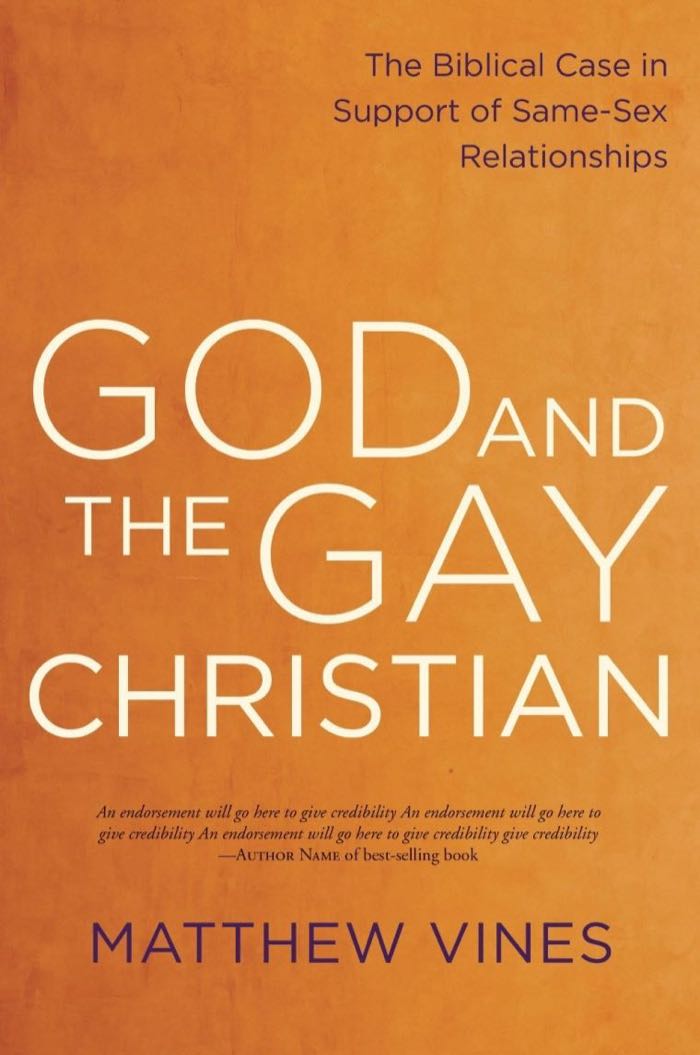God and the Gay Christian: The Biblical Case in Support of Same-Sex Relationships
Reviewed date: 2023 Mar 13
224 pages
This is not the book I'm looking for
I'm trying to find a scholarly book that makes the absolute best case, rooted in the Scriptures, for a gay-affirming Christian sexual ethic. Matthew Vines's book is not it.
I do appreciate that Vines took the time to seriously consider the Scriptures, and that he didn't settle for the first and easiest answer that allowed him to arrive at a gay-affirming sexual ethic. His is the first gay-affirming defense that I've read that I felt took the Bible seriously. Unfortunately the presumptions he makes prior to engaging in analysis of Scripture make the book unconvincing. This is not a detailed, thorough, and careful analysis of the biblical evidence. This is a book for a popular audience rooted in 20th century secular presumptions.
However, Matthew Vines did mention the book Bible, Gender, Sexuality: Reframing the Church's Debate on Same-Sex Relationships by James V. Brownson, and that sounds like the book I'm looking for. I put Brownson's book on my to-read list.
So what's wrong with it?
Matthew Vines examines the biblical texts in great detail, which I appreciate. He is wise to do so. However, his detailed handling of the Scriptures operates as a smokescreen to obscure the fact that he smuggles in some whoppers of presumptions.
Presumption: sexual orientation is a new concept
For example, Vines presupposes that sexual orientation as a concept was unknown in the ancient world, but it is a fact that we know today, and that this fact is new information that must result in a re-examining of Christian doctrines. While I'll grant that the category of sexual orientation per se is a modern (that is, 20th century) construct, it doesn't automatically follow that this is a new reality or that the biblical writers were unfamiliar with it. Human nature has not changed. The Old Testament writers and the New Testament writers were not fools, and while they may not have had terms for concepts like "sexual orientation" they were surely not unfamiliar with the variety of human sexual desire and with people whose desires are exclusively homosexual. Vines wants us to take it as an axiom that sexual orientation is a concept unfamiliar to and therefore unconsidered and unaddressed by the biblical authors. But he hasn't established that or even defended it. Further, even if we grant the proposition that sexual orientation is completely new, it doesn't automatically follow that it is right; that is, why should we accept the 20th century categories as better or more correct than the 1st century categories or than the 15th century BC categories?
Other issues
Others have written in more detail about the presumptions and mistakes that Vines makes, so I'll just mention briefly what a few things I noticed. Vines presupposes that gay Christians are harmed by non-gay-affirming doctrine, and that Paul is writing from a Greco-Roman worldview rather than a Jewish one. Vines also sets up a lot of false dichotomies. E.g., given that we now know sexual orientation is a thing, and given that we know that asking gay Christians to be celibate is the same as forcing celibacy on them, we must either totally reconsider 2000 years of Christian teaching on celibacy, or we must overturn 2000 years of Christian teaching on sexuality by affirming gay marriage. Vines presents this dichotomy repeatedly:
But in fact, trying to maintain the traditional Christian teaching on same-sex relationships as well as the traditional Christian teaching on celibacy is not an option. (p. 44)
We can embrace gay relationships and maintain a traditional view of celibacy, or we can change our understanding of celibacy and keep a traditional view of gay relationships. But we cannot do both. Christians who hold, as I do, to a high view of Scripture must decide which tradition to modify. (p. 44)
The debate over gay Christians requires us to do one of two things: change our understanding of celibacy or change our understanding of marriage (p. 57)
Now that many of us recognize that same-sex orientation is both fixed and unchosen, we need to modify one of two Christian teachings: either the voluntary nature of lifelong celibacy or the scope of marriage. (p. 134)
If we accept Vines's framing, we have to overturn a long-standing church teaching either way. That framing is faulty. There is no dichotomy. We can affirm historic church teachings on celibacy and affirm historic church teachings on marriage and sexuality. Vines can keep saying that the new 20th century category of sexual orientation changes everything, but repetition doesn't make it true. Maybe there is a convincing argument that the church's understanding of celibacy as it applies to those with same-sex attraction is incomplete or mistaken, but Vines hasn't presented such an argument. He isn't going deep enough to defend his claims. Repetition is not evidence.
Sincerity
I don't doubt the sincerity of Matthew Vines. The presumptions, presuppositions, and false dichotomies he presents do not seem to me to be intentional. He truly believes what he says is right and true. And I'm glad he took the time to engage with the Scriptures. So many people fail to do even that, regarding all sorts of issues. He's come to the wrong conclusions because he has started from the wrong premises and is looking at the Bible from a 20th century perspective rather than allowing the Bible to set the standard.
More reading
I will read the response to Vines's book, God and the Gay Christian? A Response to Matthew Vines by Al Mohler and others. I'll read The Bible and Homosexual Practice: Texts and Hermeneutics by Robert Gagnon. Finally I will read Brownson's book Bible, Gender, Sexuality: Reframing the Church's Debate on Same-Sex Relationships.
